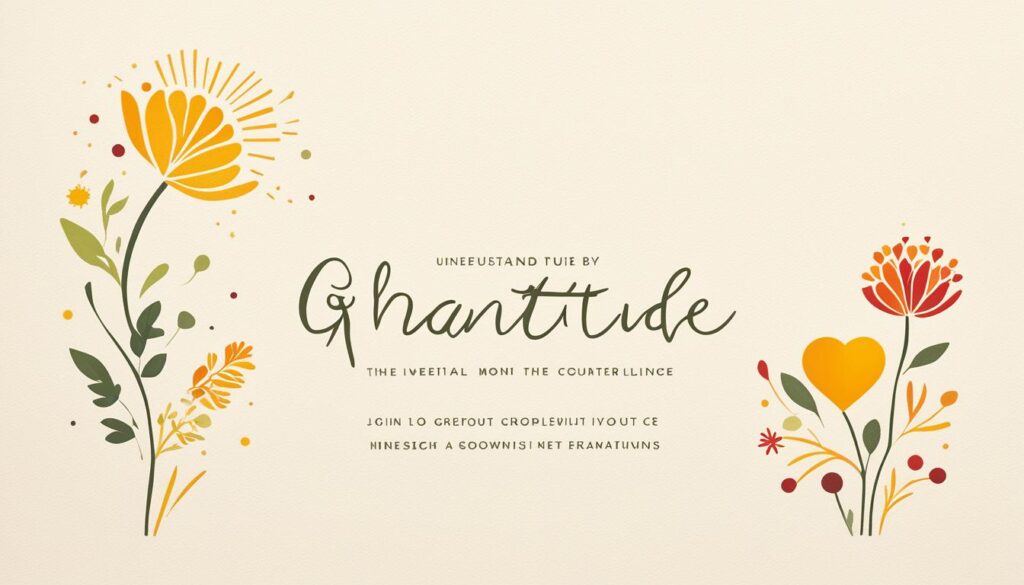“The root of joy is gratefulness.” – David Steindl-Rast
Gratitude is a powerful force that has the ability to transform our lives and bring immeasurable joy. In a world filled with challenges and uncertainties, it is easy to get caught up in the negatives and overlook the blessings that surround us. But when we take the time to cultivate a grateful mindset and express our appreciation for the things we often take for granted, we unlock a wealth of happiness and contentment.
So, what are you thankful for each day? The answer may vary from person to person, but the essence of gratitude remains the same – acknowledging and giving thanks for the abundance in our lives, big and small. Whether it’s a beautiful sunset, a kind gesture from a stranger, or the love and support of our loved ones, gratitude allows us to shift our focus from what is lacking to what is present.
When we embrace gratitude as a daily practice, we open ourselves to a world of possibilities. Research has shown that gratitude has numerous psychological and emotional benefits. It reduces stress and anxiety, increases happiness and life satisfaction, and improves overall mental health. Gratitude also improves sleep quality, boosts the immune system, and reduces symptoms of depression. It fosters resilience and helps us find meaning in difficult experiences.
So, as you embark on this journey of embracing gratitude, remember to take a moment each day to reflect on what you are thankful for. Count your blessings and let gratitude fill your heart. Because, as the Buddhist quote reminds us, the root of joy lies in gratefulness.
Key Takeaways:
- Practicing gratitude has numerous psychological and emotional benefits.
- Cultivating a grateful mindset can be achieved through techniques like keeping a gratitude journal and incorporating gratitude practices into daily routines.
- Gratitude improves sleep quality, boosts the immune system, and reduces symptoms of depression.
- Gratitude enhances personal and professional relationships by strengthening bonds, improving communication, and building trust and loyalty.
- Understanding the global and cultural dimensions of gratitude allows us to appreciate different perspectives and incorporate gratitude practices that resonate with our own values.
Understanding Gratitude
Practicing gratitude is a transformative habit that allows you to shift your focus from negativity to positivity. It opens your eyes to the blessings in your life, no matter how big or small, and helps you cultivate a grateful mindset. By incorporating gratitude practices into your daily routines, such as keeping a gratitude journal and actively expressing gratitude, you can create a ripple effect of positivity that improves your overall well-being.
When you understand gratitude, you begin to appreciate even the smallest moments of joy. It’s about acknowledging the good that exists in your life and expressing appreciation for it. Gratitude helps you find meaning in difficult experiences and fosters resilience, allowing you to bounce back and learn from challenges.
One powerful gratitude practice is keeping a gratitude journal, where you write down the things you are grateful for each day. This practice not only helps you focus on the positive aspects of your life but also serves as a visual reminder of your blessings. It is a simple yet effective way of nurturing a grateful mindset.
Another way to cultivate gratitude is by incorporating it into your daily routines. Whether it’s saying a silent thank you before meals, expressing appreciation to someone who made a difference in your day, or taking a moment to reflect on what you are grateful for before going to bed, these small actions can have a significant impact on your overall well-being.
Gratitude practices have a profound effect on your mental health. They reduce stress and anxiety, increase happiness and life satisfaction, and contribute to better sleep quality. Gratitude also boosts your immune system and reduces symptoms of depression, enhancing both your physical and mental well-being.

| Benefits of Practicing Gratitude | Effects on Mental Health |
|---|---|
| Reduces stress and anxiety | Improves sleep quality |
| Increases happiness and life satisfaction | Boosts the immune system |
| Enhances overall mental health | Reduces symptoms of depression |
Gratitude and Mental Health
Practicing gratitude has proven to be a valuable tool in reducing stress and anxiety. By expressing gratitude, you shift your attention away from worries and negative thoughts, allowing yourself to experience a sense of calm and gain a new perspective. Regularly cultivating a grateful mindset leads to lower levels of stress, which in turn enhances your ability to cope with challenging situations.
Gratitude also has a profound impact on your mental health and overall well-being. It improves sleep quality, allowing you to rest more peacefully and wake up feeling refreshed. Moreover, gratitude boosts your immune system, strengthening your body’s defenses and contributing to better overall health. It even reduces symptoms of depression, helping you maintain a positive outlook and emotional well-being.
When you focus on the positive aspects of your life and express gratitude for them, it creates a ripple effect of positivity. This ripple effect extends beyond just your own well-being and affects your relationships and interactions with others. By fostering resilience and the ability to bounce back from adversity, gratitude empowers you to navigate life’s challenges with a renewed sense of strength and purpose.
Keys Points:
- Practicing gratitude reduces stress and anxiety.
- Expressing gratitude shifts your attention away from negativity, providing calm and perspective.
- Regular gratitude practice leads to lower stress levels and improved coping abilities.
- Gratitude improves sleep quality, boosts the immune system, and reduces symptoms of depression.
- Cultivating a grateful mindset fosters resilience and the ability to bounce back from adversity.

Embracing gratitude as a daily practice can significantly improve your mental health and well-being. By actively recognizing and appreciating the positive aspects of your life, you can reduce stress, improve sleep quality, boost your immune system, and reduce symptoms of depression. Begin by expressing gratitude for the small joys and blessings in your life, and watch as your overall outlook and resilience flourish.
Gratitude in Relationships and Social Interactions
Gratitude has the power to enhance both personal and professional relationships. When you express gratitude, it strengthens the bond between individuals and fosters a deep sense of goodwill and positivity. The act of showing appreciation benefits not only the recipient but also the expresser, as it increases happiness and life satisfaction.
One of the significant benefits of gratitude is its ability to improve communication skills. When you express gratitude, it creates a safe space for open and honest conversations. By acknowledging and valuing the contributions of others, you foster an environment where everyone feels heard and understood.
Furthermore, gratitude helps build trust and loyalty in relationships. When you express gratitude towards someone, it makes them feel valued and appreciated. This sense of validation strengthens the relationship, creating an environment where both parties are motivated to invest in its growth and success.
Gratitude also has a transformative effect on the social environment. When individuals engage in acts of kindness and appreciation, it sets a positive tone that encourages others to do the same. This ripple effect of gratitude can foster a harmonious and supportive social environment, benefiting individuals and the community as a whole.
Overall, gratitude plays a crucial role in enhancing relationships, improving communication, building trust and loyalty, and fostering a positive social environment. By incorporating gratitude into your daily interactions, you can cultivate strong and meaningful connections with others.

Benefits of Gratitude in Relationships and Social Interactions:
- Strengthens the bond between individuals
- Fosters goodwill and positivity
- Increases happiness and life satisfaction
- Improves communication skills
- Creates a safe space for open and honest conversations
- Builds trust and loyalty
- Fosters a positive social environment
- Influences others to engage in acts of kindness and appreciation
The Global and Cultural Dimensions of Gratitude
Gratitude is a universal concept that transcends cultural boundaries, yet the ways in which it is expressed and practiced vary across different societies. Understanding the cultural dimensions of gratitude allows us to embrace diverse perspectives on thankfulness and deepen our appreciation of the world’s rich tapestry of cultures.
The expressions of gratitude can be influenced by societal norms and values, shaping the way individuals and communities convey their appreciation. While some cultures place emphasis on individual expressions of gratitude, others prioritize communal acts of thankfulness. These cultural nuances reflect the values and beliefs within each society and provide meaningful insights into their historical, social, and religious contexts.
Exploring gratitude across cultures not only broadens our understanding but also fosters an appreciation of diversity. Recognizing and respecting different cultural perspectives on gratitude enables us to honor and incorporate gratitude practices that align with our own values and beliefs. It is through this appreciation of diversity that we can expand our own gratitude practices and continue to cultivate a deep sense of appreciation for the world around us.
By embracing the global and cultural dimensions of gratitude, we embark on a journey of cultural exchange and interconnectivity. We learn to celebrate the myriad expressions of gratitude that exist, forming a mosaic of thankfulness that unites us as human beings. Let us continue to explore and appreciate the richness of cultural gratitude practices, fostering a global community that is united by the power of gratitude.
FAQ
What is gratitude and how can I cultivate it?
Gratitude is the practice of acknowledging and appreciating the blessings in our lives. It can be cultivated through techniques like keeping a gratitude journal, expressing thanks to others, and incorporating gratitude practices into daily routines.
What are the benefits of practicing gratitude?
Practicing gratitude has numerous psychological and emotional benefits. It reduces stress and anxiety, increases happiness and life satisfaction, improves overall mental health, enhances sleep quality, boosts the immune system, reduces symptoms of depression, fosters resilience, and helps us find meaning in difficult experiences.
How does gratitude improve mental health?
Expressing gratitude shifts our focus from negativity to positivity, reducing stress and anxiety. It improves sleep quality, boosts the immune system, and reduces symptoms of depression. Gratitude fosters resilience and the ability to bounce back from adversity, leading to improved mental well-being.
Can gratitude enhance relationships?
Absolutely! Gratitude strengthens personal and professional relationships. It fosters a sense of goodwill and positivity, improves communication skills, builds trust and loyalty, and creates an environment where both parties feel appreciated and motivated to invest in the relationship.
How does culture influence expressions of gratitude?
Gratitude is a universal concept, but its expressions and practices vary across cultures. Societal norms and values influence how gratitude is perceived and communicated. Some cultures prioritize individual gratitude, while others emphasize communal expressions. Understanding these cultural dimensions allows for a broader appreciation of diversity and incorporating gratitude practices that align with our own values and beliefs.

